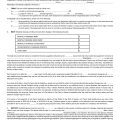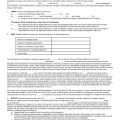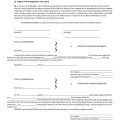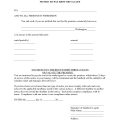Washington commercial lease agreement is signed when taking a commercial property on lease. This is a comprehensive agreement and is legally recognized. Everything is elaborated in the Washington commercial lease agreement. Information about the landlord and the tenant are entered in details. This agreement safeguards the interests of the both the parties.
Steps to Fill the Washington Commercial Lease Agreement
- In the beginning, the date, month and year are entered. Then the names of the landlord and tenant are mentioned.
- The leased property is defined by giving the complete address of the property. The layout plan of premises is prescribed as exhibit A, and the land where the property is located is given in exhibit B.
- The premises does not include external walls, anything beneath the building, and above the roof of the building. Any adjacent area to the premises does not include on the premises. These all areas are the property of the landlord and do not make a part of this lease.
- The dates of lease commencement and lease termination are mentioned in this agreement.
- Per month base rent is mentioned, and if there is a rider, then the rent after adding this rider is attached as a separate sheet.
- On the execution of this agreement, the lessee will pay an amount to the lesser, which will become the rent for the month specified in this agreement.
- The monthly rent will be paid on the specified address given in this commercial lease agreement.
- The amount of security deposit is mentioned in this agreement.
- The lessee will use this property, only for the purpose specified in this agreement, and will not use for any other purpose without the written permission of the lesser.
- The addresses of the landlord and tenant are given for payment of the rent, and for the service of notices.
Explanation Of Terms And Conditions
- The lease shall commence from the date on which the possession of the premises is taken, and this date will be mentioned in this agreement. The termination date will be modified according to the commencement date, and the term of the contract will not be changed. The lease will be for one year, which may be extended with a mutual understanding of both the parties.
- In case the landlord fails to hand over the possession within 60 days of the agreement, the tenant may cancel the deed with a ten days’ notice. The lease will be canceled without further obligation to the landlord or the tenant.
- The landlord will perform all work on the premises as per the requirements of the tenant. The tenant will make its satisfaction before taking charge of the property.
- If the tenant does not inform the landlord about any defect in the premises within ten days after receiving the possession, then this defect becomes the responsibility of the tenant.
- The tenant will pay the rent in advance on the 1st day of the month. If the tenant does not pay the rent within five days of the due date, he will pay a surcharge of 5% of the rent or USD100, whichever is more. The landlord may also charge interest at the rate of 12% of the outstanding amount.
- The tenant will pay a security deposit to the landlord, which will remain with the landlord, and will not make part of any rent.
- The tenant will not use this premises for any other purpose except mentioned in this lease agreement. The tenant will keep the premises neat and clean.
- The tenant will not use this premises for any purpose, which violates laws, rules, and regulations of the government.
- The tenant will bear all operating costs of the premises.
- The landlord will provide all utilities to the tenant at landlord’s cost.
- The tenant will pay all utility bills, except if some utilities are in shared use. In this case, the charges will be pooled as mutually agreed.
- The common area is defined as areas which are in mutual use of the tenant and the landlord, or the tenant and the other tenants. The landlord may change the common area from time to time. The rules for the use of common areas are specified in this lease agreement. The landlord will maintain the common area, and charge the cost from the tenant.
- The tenant may alter the premises with the written consent of the landlord. But it will not include any construction work.
- The tenant shall maintain the premises in good condition and will make repairs arising out of the use of the premises.
- The landlord can enter the premises by giving written notice to the tenant.
- The tenant shall take written permission from the landlord to display or hang any signs on the building.
- If the premises is damaged through flood or fire, and this does not prevent the tenant’s occupancy, the landlord will immediately repair the damage. The lease will not terminate, but if the landlord fails to restore the premises within six months of the causality, the tenant may terminate the contract. If the damage is more than 25% of occupancy, then the premises becomes un-tenantable.
- If the tenant has not taken the insurance of the premises for the above-stated damages, the landlord is not obliged to repair the damages.
- If the damage is 50% or more, then the landlord may cancel the lease, or restore the premises making it tenantable. The period for such repairs is six months. If the landlord fails to repair the premises within six months, the tenant may cancel the lease.
- The landlord will not be liable for any other claim by the tenant due to this damage.
- If the premises or a part is condemned for any reason, either the landlord or the tenant may terminate the contract. If 25% or less area of the whole premises is declared condemned, this does not render this premises un-tenantable. If the condemned area is more than 25%, the landlord may claim compensation from the condemning authority. The tenant will not get any share from this compensation. However, the tenant may separately claim his damages from the condemning authority.
- During the occupancy, the tenant will maintain general insurance for the premises, and for his employees against an injury or disability or death. The tenant will get insurance from companies rated from A-V.
- The landlord shall obtain insurance for the whole building or area including the leased premises against fire or other causalities.
- The landlord and the tenant release each other from any liabilities, damages, cost, and expenses, which are covered through insurance.
- The tenant will not sub-lease this premises without the written permission from the landlord. This sub-lease will not release the tenant from the obligations of the original contract.
- Tenant will keep this property free from any lien.
Tenant Defaults if
- Fail to pay any amount due to him within five
- Vacates the property, or is continuously absent from the premises for 15 days without informing the landlord. Or he remains absent from the premises for five days or more, and he is a defaulter in any way.
- The tenant becomes insolvent or bankrupt by any means.
- Any government agency takes the interest of the property or a portion.
- The tenant violates any clause of the lease agreement.
- The tenant fails to take possession of the premises on the commencement date.
Landlord Actions Against the Defaulting Tenant
- Terminate the lease
- Re-enter the property, expel the tenant, and re-let the property.
- The tenant may surrender all privileges under this agreement.
- Any payment not paid by the tenant will become the rent, and the landlord can recover this as rent.
- If the tenant fails to remove his property from the premises, the landlord may move and store the same at tenant’s cost.
If the landlord mortgages this premises, this agreement will become subordinate to that mortgage automatically, and the tenant is bound to abide this mortgage.
- If the landlord waives some clauses, it will not absolve the tenant from other obligations of the contract.
- If the tenant fails to vacate the premises, he will pay 125% rent on a month to month basis, or the contract will be terminated according to Washington law.
- All notices under this lease agreement will be in a written form, and will only become active when delivered in person.
- In case of any dispute, the losing party will pay all expenses.
- The landlord can assign this lease to another party without the tenant’s consent.
- The landlord will not keep any hazardous material on the premises. And if there is any, a loss or damage due to such material, the tenant will not be at fault and is not liable for any compensation.
- Tenant shall not keep any hazardous material in his premises.
- Neither landlord, nor his representative is allowed to disturb the tenant, as long as he is paying the rent regularly, and fulfilling the obligations of this contract.
- The lease and its obligations apply on the landlord, tenant, and their legal heirs and representatives.
- There is no broker claiming fees, other than specified in the contract.
- This is the entire agreement, and there is no amendments or any other clause outside this contract.
- This lease agreement is governed by the law of the country, State and the cities.
- The agent’s name of the landlord and the tenant are mentioned in this lease agreement, along with their fees.
- In the end, the landlord and tenant sign this lease agreement. The name of the country is mentioned where the deal is signed.
- A notary public confirms that the tenant and the landlord have signed this agreement in his witness. The notary public further affirms that the signing persons are authorized to execute the deal. The notary public put his signatures and affixes his official seal to make this agreement a legal document.
- This lease is governed by the Washington State Law
Washington Laws that govern the Relationship between Landlord and Tenant
- Washington RCW §§ 59 – Landlord and Tenant.
- Washington RCW §§ 59.04 – Tenancies.
- Washington RCW §§ 59.18 – Residential Landlord-Tenant Act.
- Washington RCW §§ 59.18.060 – Official Duties of a Landlord.
- Washington RCW §§ 59.18.130 – Official Duties of a Tenant.
- Washington RCW §§ 59.20 – Manufactured/Mobile Home Landlord-Tenant Act.
- Washington RCW §§ 12.36 – Small Claims Appeals.




